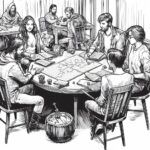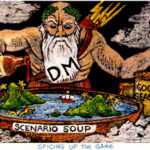In the midst of an adventure, heroes often find themselves wounded and in need of downtime. This allows them to rest, eat, and attend to their day-to-day needs, as well as providing the Dungeon Master with opportunities to introduce new challenges or surprises.
Resting
There are two types of rests: Short Rests and Long Rests.
Short Rest
A Short Rest is a brief period of downtime where characters can tend to their wounds and recover some of their vitality. During this time, each player can choose to recover 1 hit die’s worth of health by bandaging their wounds and using basic healing techniques. E.g. if you are a Barbarian, you have a d12 hit dice (per your class), roll 1d12 and heal that much in hit points.
A Short Rest typically lasts for at least 1 hour (6 turns), allowing players to catch their breath, reapply any available remedies, and prepare for the challenges ahead.
Long Rest
A Long Rest is a more extended period of downtime that allows characters to fully recover from their exertions. During this time, players can choose to sleep, engage in prayer or study to recharge their spiritual energies, and perform other activities that aid in recovery. A Long Rest typically lasts for at least 8 hours (48 turns), allowing characters to regain a significant amount of health. Furthermore, a long rest consumes 1 ration and 1 waterskin (or equiv liquid) and should be deducted from each player’s inventory.
Time Marches On
Deadlines loom. Rituals need completion before the next full moon, and wounded allies won’t last forever. Rest too long, and the world outside might move on without you. Locations are ever-changing. A storm can extinguish your torches, and a haunted crypt might leave you more exhausted than rested after a night plagued by nightmares.
Resource Depletion
- Food: A character only gets one ration per day. Resting longer means less food for later exploration.
- Light: Track torch and lantern oil usage. A long rest in a dungeon could leave characters with no light source, forcing them to press on in darkness.
- Water: Similar to food, dehydration creates a ticking clock. A character can only refill a waterskin once per day (e.g., at a river or well). Long rests deplete one waterskill, forcing choices between resting and staying hydrated.
Mitigating Risks
Players must balance resource limitations, environmental pressures, and time constraints to maximize the benefits of rest while mitigating potential dangers. Remember, even the most vigilant adventurer can be caught off guard if they underestimate the ever-present risks.
- Assigning watch duty improves the chance of detecting approaching dangers during a rest.
- Prioritizing safe locations for rest (towns, fortified outposts) minimizes the risk of attack but may lengthen travel times.
Mana Recovery
To recover mana reserves, characters must take a period of rest. The amount of mana recovered is directly tied to the duration of the rest. For every hour of rest, a character can expect to recover 10% of their total mana reserve. With a full 10 hours of rest, a character can fully replenish their mana, restoring it to its maximum value.
Death and Dying
When a character’s health reaches zero, their fate hangs in the balance. To avoid permanent demise, the player must succeed at a DC 20 Constitution saving throw against death. They have three opportunities to pass this test; if they fail, the character is lost forever, leaving only the option of resurrection or reincarnation as means of bringing them back. Spells and abilities that grant advantage on saving throws can improve their chances, but ultimately, success relies on chance.
When a character falls to zero hit points, they immediately fall unconscious and prone. As an unconscious character, they become unable to take actions, drop any held items, and attacks targeting them automatically strike as critical hits.
Print your character death certificates here!
Stabilization
Some spells, such as Heal Wound, can stabilize a character who has fallen to zero hit points. When stabilized, the character becomes stable and is no longer required to make death saving throws. However, stabilization only temporarily halts the character’s downward spiral; they are not yet healed enough to rejoin the battle. The character will remain unconscious until they are properly healed, at which point they can be revived and rejoin their allies.
Resurrection
A potential resurrection subject may be required to roll a Resurrection survival check (Constitution 10). If successful, the subject will be successfully revived. If, however, it fails, that person is gone forever. No further attempts at resurrection can be made, and attempts to contact the spirit of the deceased will always fail.
The price to have this spell cast is 1 x 1,000 GP or a Diamond of equal value.
Reincarnation
A character that is dead for no less than 10 days can be reincarnated. The reincarnated character’s soul is placed in a magically formed body and retains all of their memories and skills; however, their race is determined by random. This means all racial abilities are lost, and the new racial abilities are used.
To determine the new race of the character, roll 1d6:
- Human
- Draco
- Dwarf
- Elf
- Faun
- Halfling
The price of reincarnation includes rare oils and unguents worth a total of at least 650 GP.
Poisoned
If a player is poisoned, they have only a limited time to recover. The first step is to make a saving throw DC vs the poison’s strength and add your Constitution modifier. If the save fails, then the poison takes effect. To negate poison, there are only two options – find the antidote or get a magic-user to negate the poison.
For more details on possible character conditions (like poisoning), visit the complete list of Other Player Conditions.
This Post Has 4 Comments
Leave a Reply
You must be logged in to post a comment.







Is death final? Reading the raise dead spell I would think if the players brought a comrades body to a town with a high level healer within a set amount of time they could be revived even if the low level team cannot.
True. Dead players can be resurrected. It would cost most of the parties treasure
Does the DC20 vs Death mean that your roll + constitution has to exceed 20?
Yes